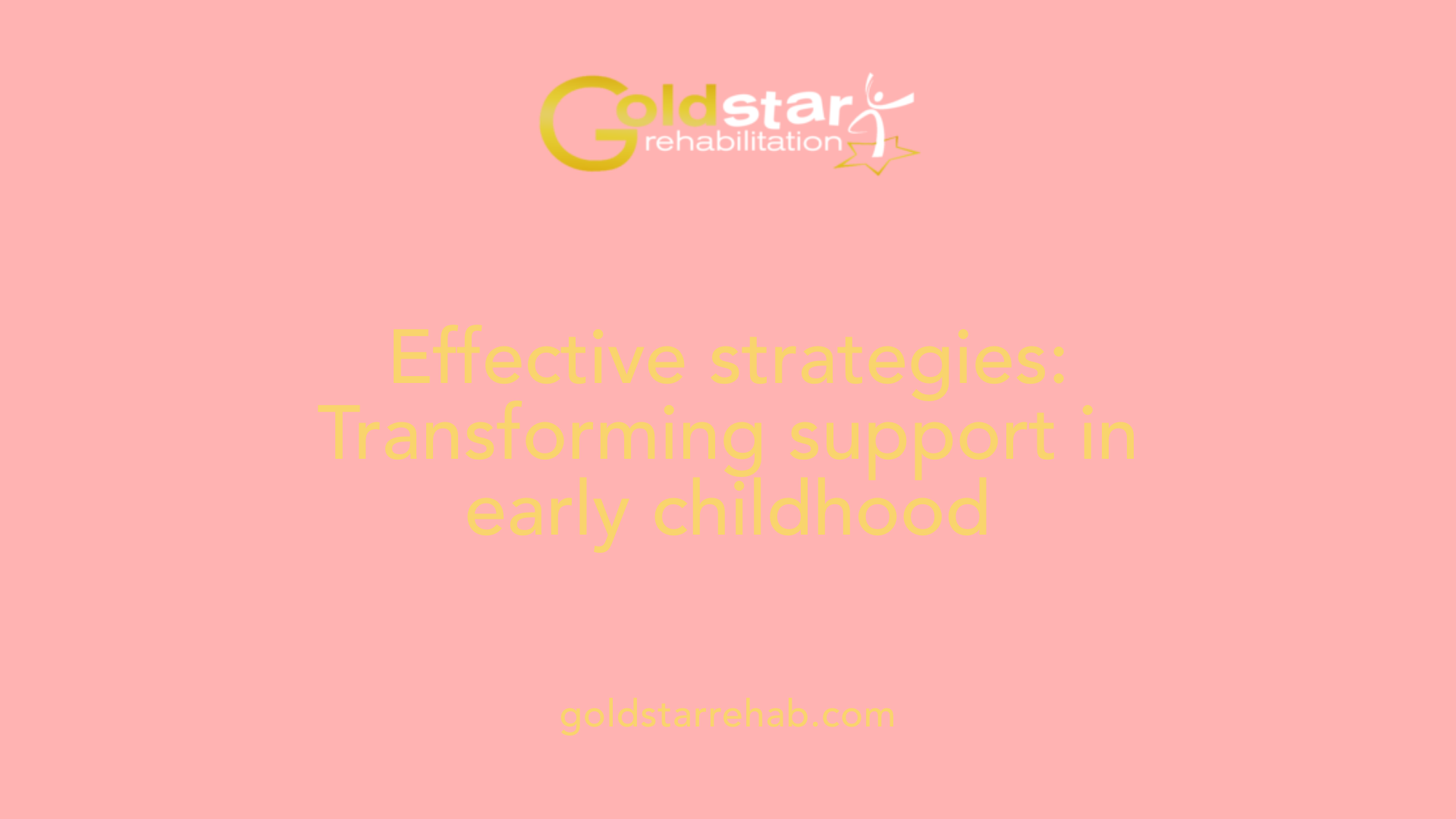The Role of Early Intervention in Reducing the Need for Special Education Services
Early Actions That Shape Future Success
Understanding the Significance of Early Developmental Support
Early intervention plays a pivotal role in shaping children’s developmental trajectories, especially during the first three years of life, when the brain's neural connections are most adaptable. This critical period offers an unparalleled opportunity to support children with developmental delays or disabilities, ultimately reducing their reliance on special education services later in life.
The Impact of Brain Plasticity and Early Intervention

Why is early intervention important in special education?
The first three years of life are a period of heightened brain plasticity, meaning the brain is especially adaptable and capable of forming new neural connections. This critical window is when children develop essential skills in cognition, language, social, and motor areas. Early intervention services, such as those offered through IDEA Part C, are designed to support infants and toddlers with developmental delays or disabilities during this sensitive period.
Providing tailored support early on can significantly improve developmental trajectories. These programs often include therapies like speech-language pathology, occupational therapy, and family training, centered around the child’s unique needs. Involving families actively in support plans and coaching enhances the effectiveness of interventions, creating a positive feedback loop that fosters progress.
Research indicates that children who receive early intervention are more likely to meet developmental milestones closer to their typical peers. Many of these children do not need special education services when they reach kindergarten, thanks to the early support they received. This not only benefits the child's academic and social success but also reduces future educational costs.
Early support also plays a vital role in promoting emotional well-being and social skills, which are foundational for lifelong learning and success. By addressing developmental challenges early, families are equipped with tools and confidence to support their child's growth.
In summary, intervening during the first three years taps into the brain’s highest capacity for change. It lays a solid foundation for future development, school readiness, and independence, ultimately helping children reach their full potential and fostering a more inclusive educational environment for all.
Early Intervention Services and Strategies

What are common intervention strategies used in special education?
In early intervention and special education, several effective strategies are commonly employed to support children with developmental delays or disabilities.
One of the most vital approaches involves behavioral therapies such as Positive Behavioral Interventions and Supports (PBIS). These aim to promote positive behavior and reduce maladaptive behaviors, creating a more conducive learning environment.
Speech-language therapy is frequently used to address communication challenges, focusing on improving language, speech, and social interaction skills.
Academic interventions, including differentiated instruction, one-on-one tutoring, and small group support, help children bridge learning gaps and navigate educational challenges more effectively.
Social-emotional support is also critical. Interventions like counseling, mindfulness practices, and conflict resolution strategies promote emotional well-being and assist children in developing healthy social skills.
Many educational settings implement frameworks such as Multi-Tiered System of Supports (MTSS) and Response to Intervention (RTI). These layered models provide escalating levels of targeted support based on ongoing data and assessments.
RTI, in particular, plays a crucial role by identifying struggling students early and offering research-based interventions tailored to their specific needs. This approach helps reduce unnecessary referrals to special education and fosters inclusive, responsive learning environments.
Successful deployment of these strategies hinges on early identification of needs, collaboration among teachers, specialists, and families,continuous progress monitoring, and adherence to evidence-based practices to maximize positive outcomes.
Overall, the integration of these intervention methods fosters the development of communication, learning, social, and emotional skills, laying a foundation for future success in school and beyond.
The Role of IDEA and Medicaid in Funding Early Support

How IDEA Part C supports infants and toddlers with delays
The Individuals with Disabilities Education Act (IDEA) established the Part C program in 1986 to provide early intervention services to children from birth to age three who experience developmental delays or are at risk due to medical conditions. Through Part C, children receive services like speech therapy, occupational and physical therapy, and family support programs tailored to their specific needs. Each child gets an Individualized Family Service Plan (IFSP), which focuses on their strengths and challenges, ensuring that intervention targets developmental areas such as communication, motor skills, and social-emotional growth. This personalized approach helps maximize each child's potential and facilitates a smooth transition to preschool programs.
The significance of Medicaid as a funding source
Medicaid plays a vital role in financing early intervention services under IDEA Part C. It supports the costs of various therapies, medical care, and social services provided to infants and toddlers with developmental delays. About half of the children served in early intervention programs are enrolled in Medicaid, which helps states cover services like audiology, mental health, and other health-related supports. Federal and state investments, especially through Medicaid, make early intervention more accessible and sustainable, ensuring that families receive needed services regardless of economic status.
Cost-effectiveness and long-term savings of early intervention
Investing in early intervention is not only beneficial for children but also cost-effective for society. Research indicates that early support during critical developmental periods reduces the need for more intensive special education and healthcare services later. For example, in 2023, approximately 540,000 infants and toddlers received early intervention under IDEA Part C, with many showing significant improvements that prevent the necessity for special education at kindergarten. These early investments lead to better social-emotional skills, higher academic achievement, and enhanced independence in adulthood. By addressing developmental issues promptly, early intervention programs help decrease long-term societal costs and promote lifelong well-being.
Positive Outcomes and Long-Term Benefits of Early Intervention

How does early intervention support children's developmental progress and reduce the future need for special education services?
Early intervention is vital for supporting infants and toddlers with developmental delays or disabilities. It addresses potential challenges early on—such as speech, motor, social, and cognitive difficulties—before they become more ingrained. Through therapies like speech-language pathology, occupational therapy, and physical therapy, children acquire foundational skills crucial for later learning.
By focusing on personalized needs through assessments and tailored educational plans like IFSPs, early intervention helps children develop confidence and social-emotional skills. Family involvement and active participation in support strategies further reinforce progress within natural environments like homes or daycare.
A significant advantage of early intervention is its timing during a period of heightened brain plasticity. Neural connections are most adaptable during the first three years, making interventions more effective. This proactive approach promotes skills that enable children to learn independently, interact socially, and adapt to educational settings.
Research shows that early intervention can lead to a decrease in the necessity for special education services later in life. Many children, thanks to early supports, reach developmental milestones closer to their peers, reducing future academic and social challenges. Overall, early intervention not only enhances individual developmental trajectories but also lessens the long-term societal and economic costs associated with intensive special education placements.
Parental and Family Engagement in Early Support Programs

What are the benefits of early intervention programs for children and families?
Early intervention programs offer substantial advantages for both children and their families. These initiatives support developmental growth across crucial areas such as language, social skills, cognitive abilities, and emotional health. By intervening early, particularly within the first three years — a period when the brain is most adaptable — these programs can significantly influence a child's developmental path, resulting in improved academic performance, better behavior, and increased chances for future success.
For families, early intervention provides valuable resources, customized guidance, and direct support, which empower them to meet their child's unique needs. Family participation enhances the effectiveness of services, creating a supportive environment that fosters ongoing development.
Investing in early intervention can also lead to societal benefits by reducing the need for more intensive educational or health services later in life. Overall, these programs are a vital part of nurturing children's potential, promoting family well-being, and offering long-term economic and social advantages.
Reducing Disproportionality and Ensuring Equity in Early Support
Why is early intervention important in special education?
Early intervention during a child's first years is vital because it leverages the brain's high plasticity during this period. Children with developmental delays or disabilities benefit from tailored services that address their specific needs early on. Programs like IDEA Part C offer a range of evidence-based supports, including speech therapy, occupational therapy, and family guidance.
Involving families actively through coaching and training enhances the child's progress. Early intervention also helps prevent or lessen long-term learning, behavioral, and health challenges by addressing issues before they become more ingrained.
Research shows promising outcomes: many children who receive early intervention do not need special education services later in school. This reduces educational costs and supports better academic and social success.
Furthermore, early support fosters social-emotional skills and prepares children for classroom settings, setting a strong foundation for their future.
Addressing systemic disparities and promoting equity
Despite its benefits, disparities persist in access and quality of early intervention services, especially among non-white children and those from marginalized communities. Disproportionality can lead to misdiagnosis and underrepresentation of vulnerable groups in intervention programs.
To combat this, culturally responsive screening and assessment practices are essential. These approaches recognize the diversity of children's backgrounds and experiences, ensuring that evaluations are fair and accurate.
System-level practices should also focus on reducing barriers stemming from socioeconomic and racial inequities. This includes improving transportation, increasing awareness among underserved populations, and providing services in multiple languages.
Incorporating inclusive, trauma-informed approaches
Creating inclusive early childhood systems requires integrating trauma-informed practices. Many children exposed to adverse experiences may exhibit behavioral and emotional challenges that could be misinterpreted or overlooked.
Trauma-informed care involves ongoing staff training and policies that prioritize safety, trust, and emotional healing. This approach supports children in overcoming trauma impacts, helping them engage more effectively in learning and social interactions.
An inclusive system values diverse developmental trajectories and promotes relationships that respect each child's background and experiences. This strengthens family partnerships and enhances intervention effectiveness.
| Strategies | Focus Areas | Outcomes |
|---|---|---|
| Culturally responsive screening | Fair assessment practices | Accurate diagnosis, fair resource allocation |
| Addressing systemic disparities | Reducing barriers | Increased access for marginalized groups |
| Trauma-informed practices | Support for trauma-affected children | Improved emotional well-being, better engagement |
By prioritizing culturally responsive, systemic, and trauma-aware practices, early intervention systems can better serve all children equitably. This not only improves developmental outcomes but also promotes a more just and inclusive approach to early childhood education and support.
Building a Foundation for Lifelong Success
Investing in early intervention programs is a strategic move to support optimal child development, reduce long-term educational costs, and promote equitable opportunities for all children. By addressing developmental delays early and involving families actively, these programs improve outcomes across multiple domains—cognitive, social, emotional, and behavioral—while laying a strong foundation for future independence. Systemic efforts, including proper funding, culturally responsive practices, and integrated support systems like RTI and IDEA, ensure that every child has access to the services they need during this critical window. Ultimately, early intervention not only benefits individual children and their families but also creates a healthier, more inclusive society, emphasizing prevention over remediation.
References
- The Importance of Early Intervention in Education
- The Role Of Early Intervention Services In Special Education
- Why Early Intervention? A Great Opportunity for Children and Families
- Importance of early intervention as it relates to developmental delay ...
- Early Intervention & Special Education | Frank Porter Graham Child ...
- [PDF] What is Early Intervention and Why is it Important | USU IDRPP
- How 'Early Intervention Services' Help Special-Needs Students?
- Making Hope A Reality: Early Intervention for Infants and Toddlers ...
- A Review on Early Intervention Systems - PMC
.png)



























